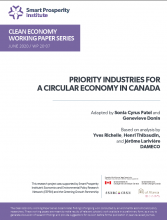June 25, 2020
The circular economy provides an alternative to the traditional linear ‘take-make-waste’ economy. Ideally, it is a sustainable, productive economic model that is financially, environmentally, and socially sustainable. It is characterized by highly efficient use of resources and a continuous recirculation of post-consumer materials while using renewable energy. It operates in a continually evolving cycle.
This report adapted by Sonia Cyrus Patel and Genevieve Donin builds on the quantitative methodology initially developed for Quebec in 2018 by Yves Richelle for L’Institut EDDEC. It presents a preliminary economic analysis to identify industries with a high potential to become more circular in Canada, its territories and provinces based on popular circular initiatives taking place globally.
The Clean Economy Working Paper Series disseminates findings of ongoing environmental and clean economy work conducted by researchers from a range of disciplines. These working papers are meant to make results of relevant scholarly work available in a preliminary form. Although these papers have not undergone a peer-review process, they meet general standards of scholarly excellence. The views expressed in these working papers are those of the authors and do not necessarily reflect the opinions of Smart Prosperity Institute.



